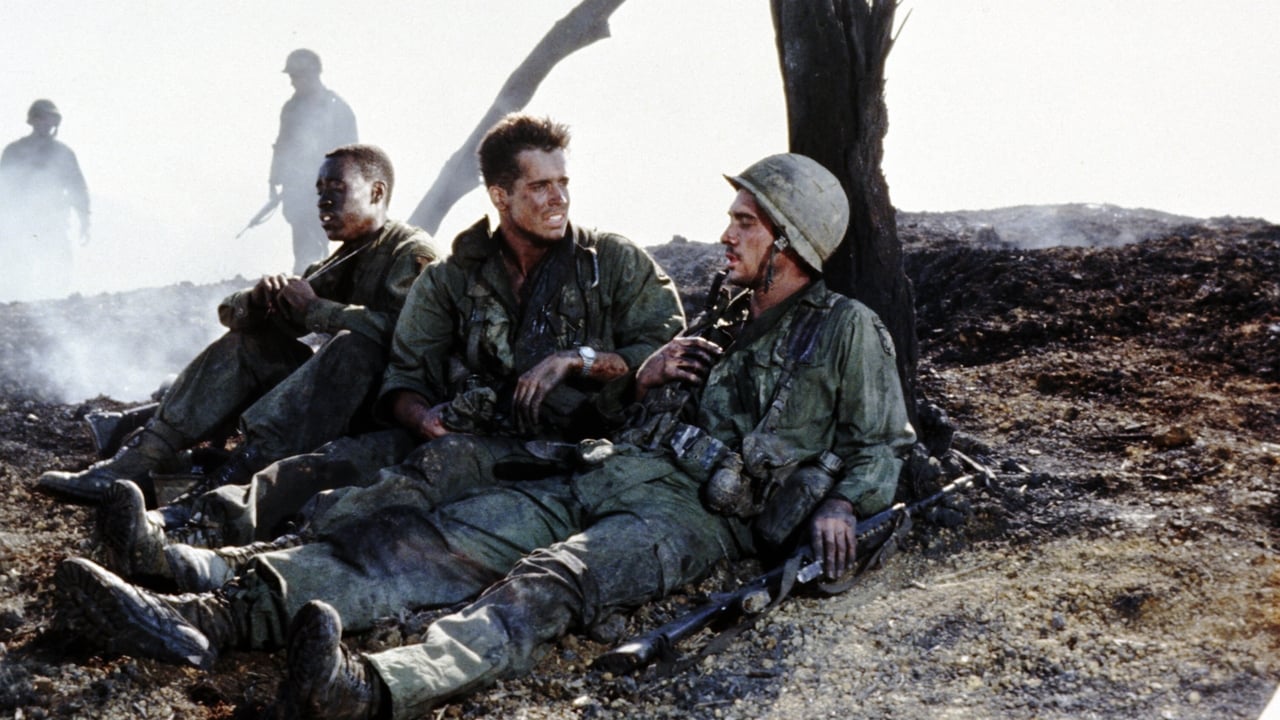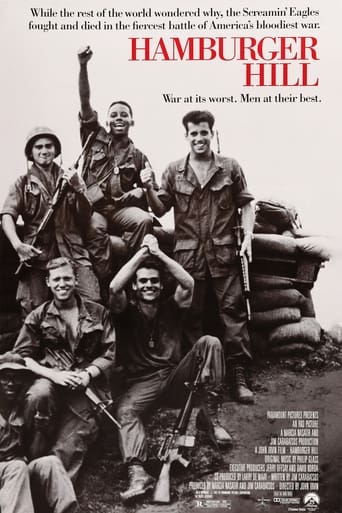tieman64
"Since trade ignores national boundaries and the manufacturer insists on having the world as a market, the flag of his nation must follow him, and the doors of the nations which are closed against him must be battered down." - Woodrow Wilson "Let me tell you about your blood, bamboo kid, it ain't Coca Cola, it's rice. Go straight to hell boys. Go straight to hell." - The Clash Directed by John Irvin, and based loosely on a true story, "Hamburger Hill" follows a US Brigade as it launches an assault on a well-fortified position occupied by the North Vietnamese Army during the Vietnam war.Shot on location in the Philippines, "Hill's" first act is its strongest. Here we watch as a band of US soldiers fill sandbags, lounge in trenches, monitor a river passage and journey to nearby brothels. These sequences are well shot, boast some fine location photography and competently capture the tempo of both local life and military R and R. And where most Vietnam war flicks portray Vietnam as but an unending jungle, "Hill" does well to clearly map out the three main geographical spheres of the war: "allied" territory in South Vietnam (a mixture of urban spaces and small villages), the always moving border between north and south, and the chaotic jungles to the north, often accessible only by helicopter."Hill's" second act watches as a squad, led by Adam Frantz (Dylan McDermott), attempts to take the aforementioned hill (Hill 937). We then get sequences in which unsympathetic journalists are berated and disgruntled grunts talk about being spat on by anti-war protesters. These sequences set up the film's limited, "love the troops" philosophy. Next comes much generic grunt banter and a final act which amounts to but the usual war porn, soldiers yelling for medics, dodging bullets, throwing grenades and being perforated by lead. This is all presented as a noble but horrible sacrifice and war is again reduced to but an apolitical game fought for the buddy next to you.Unsurprisingly, "Hamburger" neglects to mention how strategically superfluous taking Hill 937 was, and how the US military abandoned 937 promptly after taking it. Irvin also ignores the fact that the NVA had barely a couple hundred men holding the hill, whilst the US military threw almost two thousand men at it, including huge levels of hardware (artillery, hundreds of air-force missions, helicopters etc). In Irvin's hands, this is a battle between a small group of Americans and an unending horde of Asian savages. Maintaining this underdog illusion is largely why you rarely see footage of US super-bombers carpet bombing Vietnam.All wars are based on some kind of lie. In terms of US history, you had two Gulf Wars and an Afghanistan invasion based on lies (WMDS, the Nurse Nayirah fiasco, faked baby incubators, faked al-Qaeda links etc), you had the lie of Spaniards mining the USS Maine to justify the colonisation of Cuba, Puerto Rico, Guam, Hawaii and the Philippines, and you had similar fabrications used to spearhead hundreds of bloody actions across Asia, Africa, the Middle East and Latin America. In terms of Vietnam, you had the bogus Golf of Tonkin incidents and faked bombings in Saigon blamed on "communists". The US media at the time was complicit in selling these lies. Indeed, sociologist George Bayley, who mapped media coverage during the era, found that barely 3 percent of all network news "recorded" the "enemy" viewpoint (as well as minimising the impact of the war and the opposition it arouse), a graphic illustration of the media's one-sided stance. Bayley also found that virtually all daily combat reports were sourced from the army's public relations department, which in 1971 alone spent two hundred million dollars trying to improve the army's image.Today, Vietnam is still portrayed as a pseudo-romantic little blunder, rather than a calculated slaughter (philosopher Jean-Paul Sartre would spend years pushing for the war to be classed as a "genocide"). That the US armed, funded and backed French Imperialism in Vietnam is ignored, that it was constantly asked by the Vietnamese (as early as the 1920s and 30s) for assistance is ignored, as is the fact that the Vietnamese were constantly begging for help implementing a US styled Constitution (a nation whom the Vietnamese revolutionaries admired). After these betrayals, the US artificially divided the country (sanctioned via various international puppet bodies), flew in puppet dictators, did its best to scuttle all local elections and did its best to ignore the fact that even the South wanted it out.In the meantime, the largest bombing campaign in the history of the planet was green-lit (8 million tons of bombs dropped onto the peoples of Indochina by the United States), 3-5 million Vietnamese were killed by aggressive force (and over 100,000 Cambodians by US bombs, with defunct bombs still regularly exploding), and the largest aerial spraying of chemical weapons was rubber stamped, including 11.2 million gallons of Agent Orange and 400,000 tons of napalm. Millions would suffer from generations-spanning mutations, full-body disfigurement, undernourishment, chemical infestation, mental illness and trauma and even today over 100,000 Vietnamese are born mutated. The Pentagon itself estimates that 4.8 million Vietnamese people were exposed to Agent Orange, resulting in 400,000 deaths/disabilities, and 500,000 children born with defects. All this saturation bombing, the tens of thousands killed by political assassination and counter-terrorism programs, the routine "headshot" killings of civilians, the calculated killing of crops (almost 20 percent of the forested area of Vietnam was chemically castrated), burning of villages and destruction of industrial infrastructure, is routinely ignored by Vietnam War films. Instead they do what "Hamburger Hill" does; woe is white man.7/10 – See instead: "Go Tell the Spartans", "Full Metal Jacket", "The Quiet American", Pontecorvo's "Burn!", "Walker", "Tigerland", "Winter Soldier", "In The Year of the Pig", "Hearts and Minds", "Paths of Glory", "Southern Comfort" and "Casualties of War".

